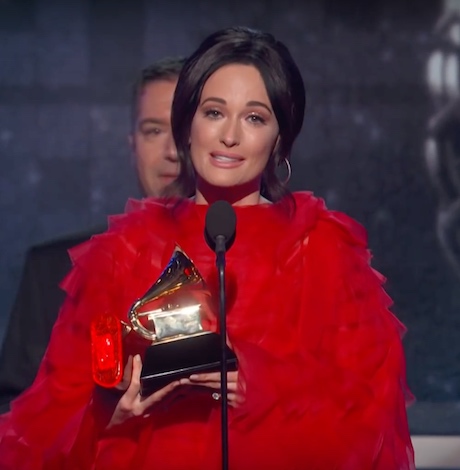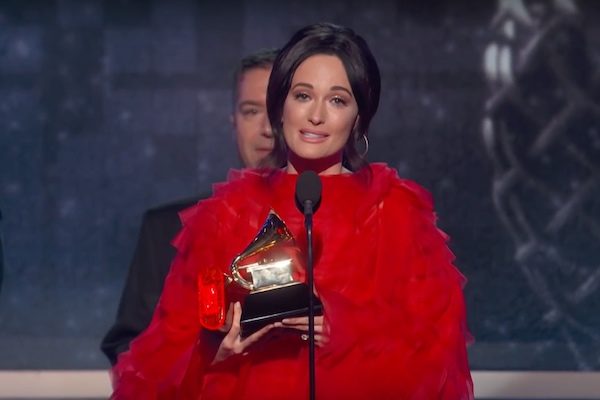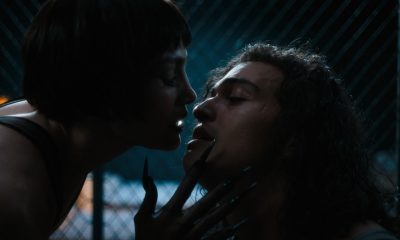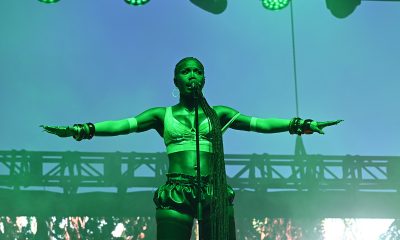Arts & Entertainment
LGBT ally Kacey Musgraves wins big at queer-dominated Grammys
Brandi Carlile, Lady Gaga also rack up wins


Country singer Kacey Musgraves won the coveted Album of the Year award for her album “Golden Hour” marking the end of a Grammys award show filled with plenty of queer women representation.
Musgraves, who also won Country Album of the Year, has emerged as an LGBTQ ally in the country music world. She has spoken up for more LGBTQ inclusion in country music and her song “Follow Your Arrow” was hailed as a pro-LGBTQ anthem. Musgraves also served as
Lesbian singer/songwriter Brandi Carlile won three awards during the pre-telecast including Best Americana Album for “By the Way, I Forgive You” and Best American Roots Song and Best American Roots Performance for “The Joke.” She received the most nominations of any woman this year and became the first LGBTQ person to win awards in those categories.
While accepting the award for Best American Roots Performance, she shared that she came out in high school at age 15. She says she never was invited to high school parties or dances.
“I never got to attend a dance. To be embraced by this enduring and loving community has been a dance of a lifetime,” Carlile said. “Thank you for being my island.”
Brandi Carlile just won 3 Grammys in a row, and if there was one for “Best Speech,” it might have been 4 pic.twitter.com/CBtXyX3lyl
— Dave Paulson (@ItsDavePaulson) February 10, 2019
Carlile also received a standing ovation for her vocal powerhouse performance of “The Joke” during the televised ceremony.
Other queer artists with impactful Grammys performances were Ricky Martin who performed with Camila Cabello, J Balvin, Arturo Sandoval and Young Thug for a Broadway musical-inspired Grammys opener to Cabello’s song “Havana.”
Miley Cyrus, who identifies as pansexual, dueted with Shawn Mendes on his song “In My Blood.” She later also teamed up with Katy Perry, Maren Morris, Musgraves and Little Big Town for a tribute to Dolly Parton.
Janelle Monáe performed her bisexual anthem “Make Me Feel” off her album “Dirty Computer,” mixed in with her feminist song “
She didn’t win for either category she was nominated for (Album of the Year and Best Music Video) but she did dedicate her nominations to her “trans brothers and sisters.” In an interview with Variety, the singer was asked about coming out as queer last year.
“People do it everyday,” she replied. “My trans brothers and sisters, they do it everyday. And they are shunned from these sorts of events. So this one is for them.”
Lady Gaga scored two wins (Best Pop Duo/Group Performance and Best Song Written For Visual Media) for her “A Star is Born” duet with Bradley Cooper, “Shallow,” which she also performed.
Dua Lipa and St. Vincent, who is sexually fluid, did a steamy joint performance of her song “
“Masseduction” + “R-E-S-P-E-C-T” +”One Kiss” = @st_vincent and @DUALIPA #GRAMMYs pic.twitter.com/HlLcUAjCcF
— Recording Academy / GRAMMYs (@RecordingAcad) February 11, 2019
History continued to be made with Cardi B becoming the first woman to win Best Rap Album and “This is America” by Childish Gambino winning Best Song. This is the first time a rap song has won in that category.
Jennifer Lopez also gave a dance-filled tribute to Motown while Diana Ross honored her own birthday, which is in March, with a performance. Michelle Obama, Lady Gaga, Jada Pinkett-Smith and Lopez also made appearances at the top of the show to help host Alicia Keys reflect on the importance of music.
Check out the complete list of winners below.
Album Of The Year — “Golden Hour”- Kacey Musgraves
Record Of The Year — “This Is America” – Childish Gambino
Best New Artist — Dua Lipa
Best Rap Album — “Invasion Of Privacy”- Cardi B
Best R&B Album Winner — “H.E.R.”- H.E.R.
Best Rap Song — “God’s Plan”- Drake
Best Country Album — “Golden Hour”- Kacey Musgraves
Song Of The Year — “This Is America”- Childish Gambino
Best Pop Duo/Group Performance — “Shallow” Lady Gaga & Bradley Cooper
Producer Of The Year, Non-Classical — Pharrell Williams
Best Rap/Sung Performance — “This Is America”-Childish Gambino
Best Rap Performance — “King’s Dead”- Kendrick Lamar, Jay Rock, Future & James Blake / Bubblin,
Best Rock Album — “From The Fires”-Greta Van Fleet
Best Rock Song — “Masseduction” – St. Vincent
Best Metal Performance — “Electric Messiah”- High On Fire
Best Rock Performance — “When Bad Does Good”- Chris Cornell
Best Urban Contemporary Album — “Everything Is Love”- The Carters
Best R&B Song — “Boo’d Up”- Ella Mai
Best Traditional R&B Performance — “Bet Ain’t Worth The Hand”- Leon Bridges / “How Deep Is Your Love”-Pj Morton Featuring Yebba
Best R&B Performance — “Best Part”- H.E.R. Featuring Daniel Caesar
Best Latin Jazz Album — “Back To The Sunset”- Dafnis Prieto Big Band
Best Large Jazz Ensemble Album — “American Dreamers: Voices Of Hope, Music Of Freedom”- John Daversa Big Band Featuring Daca Artists
Best Jazz Instrumental Album — “Emanon”- The Wayne Shorter Quartet
Best Jazz Vocal Album — “The Window”- Cécile Mclorin Salvant
Best Improvised Jazz Solo — “Don’t Fence Me In”- John Daversa
Best Reggae Album — “44/876”- Sting & Shaggy
Best Dance/Electronic Album — “Woman Worldwide”- Justice
Best Dance Recording — “Electricity”- Silk City & Dua Lipa Featuring Diplo & Mark Ronson
Best Contemporary Classical Composition — “Kernis: Violin Concerto”- James Ehnes, Ludovic Morlot & Seattle Symphony
Best Classical Compendium — “Fuchs: Piano Concerto ‘Spiritualist’”; Poems Of Life; Glacier; Rush”- Joann Falletta
Best Classical Solo Vocal Album —” Songs Of Orpheus”-Monteverdi, Caccini, D’india & Landi, Karim Sulayman
Best Classical Instrumental Solo — “Kernis: Violin Concerto”- James Ehnes
Best Chamber Music/Small Ensemble Performance — “Anderson”- Laurie: Landfall, Laurie Anderson & Kronos Quartet
Best Choral Performance — “Mcloskey: Zealot Canticles”- Donald Nally
Best Opera Recording — “Bates: The (R)Evolution Of Steve Jobs”-Michael Christie, Garrett Sorenson, Wei Wu, Sasha Cooke, Edward Parks & Jessica E. Jones
Best Orchestral Performance — “Shostakovich: Symphonies Nos. 4 & 11”- Andris Nelsons
Producer Of The Year, Classical — Blanton Alspaugh
Best Engineered Album, Classical — “Shostakovich: Symphonies Nos. 4 & 11”- Andris Nelsons & Boston Symphony Orchestra
Best Pop Vocal Album — “Sweetener”- Ariana Grande
Best Traditional Pop Vocal Album — “My Way” -Willie Nelson
Best Pop Solo Performance — “Joanne (Where Do You Think You’re Goin’?)”- Lady Gaga
Best Country Song — “Space Cowboy” – Kacey Musgraves
Best Country Duo/Group Performance — “Tequila”- Dan + Shay
Best Country Solo Performance — “Butterflies”- Kacey Musgraves
Best Music Film — “Quincy”- Quincy Jones
Best Music Video — “This Is America”-Childish Gambino
Best Regional Roots Music Album — “No ‘Ane’I”- Kalani Pe’a
Best Tropical Latin Album — “Anniversary”- Spanish Harlem Orchestra
Best Regional Mexican Music Album (Including Tejano) — “¡México Por Siempre!”- Luis Miguel
Best Latin Rock, Urban Or Alternative Album — “Aztlán”- Zoé
Best Latin Pop Album — “Sincera”- Claudia Brant
Best Spoken Word Album (Includes Poetry, Audio Books & Storytelling) — “Faith – A Journey For All”- Jimmy Carter
Best Children’s Album — “All The Sounds”- Lucy Kalantari & The Jazz Cats
Best Folk Album — “All Ashore”- Punch Brothers
Best Contemporary Blues Album —” Please Don’t Be Dead”- Fantastic Negrito
Best Traditional Blues Album — “The Blues Is Alive And Well”- Buddy Guy
Best Bluegrass Album —”The Travelin’ Mccourys”- The Travelin’ Mccourys
Best Americana Album — “By The Way, I Forgive You”- Brandi Carlile
Best American Roots Song — “The Joke”- Brandi Carlile
Best American Roots Performance — “The Joke”- Brandi Carlile
Best New Age Album — “Opium Moon”- Opium Moon
Best Song Written For Visual Media — “Shallow”- Lady Gaga & Bradley Cooper
Best Score Soundtrack For Visual Media — “Black Panther”- Ludwig Göransson
Best Compilation Soundtrack For Visual Media — “The Greatest Showman”- Hugh Jackman (& Various Artists)
Best World Music Album — “Freedom”- Soweto Gospel Choir
Best Roots Gospel Album — “Unexpected”- Jason Crabb
Best Contemporary Christian Music Album — “Look Up Child”- Lauren Daigle
Best Gospel Album — “Hiding Place”-Tori Kelly
Best Contemporary Christian Music Performance/Song — “You Say” -Lauren Daigle
Best Gospel Performance/Song — “Never Alone”- Tori Kelly Featuring Kirk Franklin
Best Contemporary Instrumental Album — “Steve Gadd Band”- Steve Gadd Band
Best Immersive Audio Album —” Eye In The Sky – 35th Anniversary Edition”- The Alan Parsons Project
Best Remixed Recording — “Walking Away (Mura Masa Remix)”- Haim
Best Engineered Album, Non-Classical — “Colors”- Beck
Best Historical Album — “Voices Of Mississippi: Artists And Musicians Documented By William Ferris”
Best Album Notes —” Voices Of Mississippi: Artists And Musicians Documented By William Ferris”
Best Boxed Or Special Limited Edition Package — “Squeeze Box: The Complete Works Of ‘Weird Al’ Yankovic” Weird Al Yankovic
Best Recording Package — “Masseduction”- St. Vincent
Best Arrangement, Instruments And Vocals — “Spiderman Theme”- Randy Waldman Featuring Take 6 & Chris Potter
Best Arrangement, Instrumental Or A Cappella — “Stars And Stripes Forever”- John Daversa Big Band Featuring Daca Artists
Best Instrumental Composition — “Blut Und Boden (Blood And Soil)”- Terence Blanchard
Best Alternative Music Album — “Colors”- Beck
Best Musical Theater Album — “The Band’s Visit”- Original Broadway Cast
Best Comedy Album — “Equanimity & The Bird Revelation”- Dave Chappelle
a&e features
35 years after ‘Truth or Dare,’ Slam is still dancing
Salim Gauwloos on Madonna, HIV, and why he almost didn’t audition for Blond Ambition Tour

Most gay men of a certain age remember “the kiss.”
It was the moment Madonna’s dancers Salim Gauwloos and Gabriel Trupin locked lips in the hit 1991 documentary film “Truth or Dare,” which is celebrating its 35th anniversary this spring.
The kiss was hot, but what made it groundbreaking is that it appeared in a mainstream Hollywood movie that screened in suburban multiplexes across the country. This wasn’t an obscure art house film. The movie, and tour on which it was based, received months of breathless media attention all over the world for bold expressions of female empowerment and queer visibility. Madonna was threatened with arrest in Toronto for simulating masturbation on stage and Pope John Paul II urged Catholics to boycott the show, triggering a media firestorm.
“Truth or Dare” was billed as a behind-the-scenes documentary of the tour, but it quickly became clear that the real star of the show wasn’t Madonna, but rather her colorful troupe of seven backup dancers, six of whom identified as gay: Kevin Stea, Carlton Wilborn, Luis Xtravaganza Camacho, Jose Gutierez Xtravaganza, Gauwloos, and Trupin; Oliver Crumes III identifies as straight.
We saw them party and march in the New York City Pride parade. They were unabashedly queer at a dangerous time — before protease inhibitors began to stem the AIDS plague and before most celebrities and politicians embraced the gay community in any real way. Being out in 1991 carried major risks to career and reputation.
Enter Gauwloos, one of those brave dancers who vogued his way into the hearts of countless gay men entranced by his handsome looks, his stage presence, and dance skills.
Gauwloos — known then and now as “Slam”— sat down with the Blade to talk Madonna, the lasting impact of “Truth or Dare,” the public disclosure of his HIV status, and plans for a new book on his life.
His story is fascinating — from growing up in Europe to dancing in New York to landing the gig of a lifetime with Madonna. He performed on that tour while secretly HIV positive and went without medical treatment for 10 years because he was living in the United States as an undocumented immigrant. Not even Madonna knew of his HIV status. Two other dancers on the tour were also HIV positive but no one talked about it. Ironically, Madonna was singing “Express Yourself” and advocating for condom use during her concerts yet backstage three of her dancers were secretly positive.
“A lot of people were dying so I wasn’t going to tell Madonna I had HIV,” said Slam, now 57. “And the others didn’t either. It wasn’t the moment to do it. She used to make speeches about Keith Haring and AIDS and I thought it’s going to be me next.”
Gabriel Trupin died of AIDS in 1995. Slam was diagnosed at age 18 in 1987, a frightening time when a positive test result often meant a death sentence. He booked the “Blond Ambition Tour” at age 21 after moving to New York. His friends encouraged him to audition but Slam resisted because he wasn’t a big Madonna fan.
“It was crazy, everyone wanted that job,” he said, “but I wanted to dance with Janet Jackson and Paula Abdul.” He listened to his friends and shortly after the audition, Slam received a call from Madonna herself inviting him to join the tour.
“We all wanted to be stars but not even Madonna knew how big that tour would become. The way it was choreographed and directed, the stars aligned. … It never looks dated even today.”

The world tour kicked off in Japan in April 1990 then moved to the United States and Europe, stirring controversy wherever it went. There was the iconic cone bra; the aforementioned simulated masturbation during “Like a Virgin”; and religious imagery that offended many Catholic groups and the Vatican.
And the controversy didn’t end with the tour. Cameras were rolling throughout the tour for what Slam thought would be a “video memory” for Madonna. But as the tour unfolded, director Alek Keshishian reportedly became more interested in what was happening behind the scenes so plans for mere tour footage were expanded into a full documentary.
“We were young and partying and didn’t really know what was going on,” Slam said. “You live in this celebrity bubble and you sign a paper – I don’t even know what I signed.”
In 1992, Kevin, Oliver, and Gabriel sued Madonna for invasion of privacy and fraud claiming she used some footage without their consent. They claim they were told nothing would be included in the film that they didn’t want to be seen. In one specific incident, Gabriel alleged that he told producers he didn’t want the scene of him kissing Slam to be in the film as he wasn’t fully out.
“Gabriel was forcibly outed,” in the movie, Kevin said in a 2016 interview.
Slam did not join his colleagues in the lawsuit.
“I couldn’t sue because I was illegal but I wasn’t ever going to sue,” Slam said. “I’m not a suing kind of person. But good for them, they fought for it and won. A lot of people don’t have the balls to sue Madonna.” The suit was settled two years later for an undisclosed sum.
“We were all conflicted about the kiss,” he said with a laugh. “The kiss, oh my God, my boyfriend is going to kill me! Belgian stress!”
Beyond worrying about his boyfriend’s reaction, Slam had concerns about the impact of being openly gay on his modeling career.
“In 1990, you couldn’t get high fashion campaigns as an openly gay model,” he said. “I was worried about that. I couldn’t get a campaign because I was gay. My agency told me to say I was straight and it was just a game.”
In 2016, pegged to the 25th anniversary of “Truth or Dare,” the surviving six dancers filmed a documentary about their lives post-Madonna titled “Strike A Pose.” In it, Slam publicly revealed his HIV status for the first time in an emotional scene with his former colleagues.
“I found the strength to tell the world I have HIV,” he recalls. “I was scared but I felt brave. The outcome and messages were beautiful. After I saw ‘Strike A Pose,’ I knew we gave people hope. And not just for gay people.”
He was infected in 1987 but didn’t get treated until 1997. After the tour ended, he said he went into a depression and his agency dropped him.
“I was partying too much after the tour,” he recalls. “I made a decision to live as an illegal alien.” In 1997, Slam collapsed and was rushed to the hospital with pneumonia.
“They started treating me and thank God the new HIV drugs were out, the cocktails, it took me a couple months to get better.”
Madonna didn’t participate in “Strike A Pose” and Slam said he hasn’t seen or spoken to her since the end of the tour. He said he had no idea of the impact “Truth or Dare” would have.
“You look at this movie in 1991 and you don’t think it’s going to be such a big thing and 35 years later it’s still helping people,” he said. “It was helpful for people who felt alone at that time. It was such an important documentary.
“I don’t think younger gay people realize how important Madonna was to gay and queer visibility — she was a big part of it. We showed the world it’s OK to be gay and that was the great message of this movie.”
He noted that, decades later, many of his friends have transgender kids and that queer culture is represented in much of mainstream pop culture.
“It’s amazing how far we’ve come,” he said. “I know we’ll always be marginalized but we have come so far. I’m really proud of our community. The current nightmare will be over and I do believe that things will get better.”
Referencing President Trump’s attacks on the LGBTQ community and crackdown on immigration, Slam described the situation in the U.S. today as “sad.”
“Everything is such a mess,” he said. “Some of these people have lived here 30-40 years and they take you out of your home. I can’t even imagine. It breaks my heart. When I was illegal it was a different story.”
Slam met his husband, Facundo Gabba, who’s from Argentina, in 2000, and he helped him get a legal case together to win citizenship. He filed a case in 2001 and was told there was a 99 percent chance he wouldn’t be permitted to stay in the United States because they weren’t allowing HIV-positive immigrants to remain in the country. But he got his green card anyway in 2005 and became a U.S. citizen in 2012.
Today, Slam and Gabba live in Brooklyn, though they travel a lot because “I can’t take the cold.” The couple married in Argentina in 2010 and in the U.S. in 2016.
Slam is still dancing and working as a choreographer. He’s teaching at a contemporary dance festival in Vienna in July and even offers online lessons via Salimdans.com.
As a longtime HIV survivor, Slam is dedicated to a healthful lifestyle.
“You have to keep moving; when you move you stay healthy,” he says. “Dance heals everything. I do yoga, I eat healthy and clean as possible. I don’t watch much TV … I try to stay healthy and positive. If I absorb all of the negativity I would be sick.”

In addition to his ongoing work in dance and choreography, Slam is in the early stages of writing a book about his extraordinary life and pioneering career.
“I always knew I had a book inside of me. I want to talk about my HIV status. I know I can inspire more people. I want to tell even more secrets in the book; secrets are a poison so I want to tell everything.”
Among those secrets, he notes, is a desire to write about his strict Muslim father and the years he spent as an undocumented immigrant in America.
“Those are the things I want to talk about, the struggles. It’s a love story, hope and resilience. I know it will help people.”
As for his friends from the tour, Slam says he remains in contact with Gabriel’s mother and José Xtravaganza is his best friend. Baltimore’s Center Stage theater is currently developing a new musical about Xtravaganza’s life. And Slam said he occasionally talks to Oliver, though “he still can’t pronounce Sandra Bernhard’s name.”
At the end of our interview, Slam indulged a round a rapid fire questions:
• Favorite song to perform in the “Blond Ambition” tour? “Express Yourself.”
• Aside from Madonna, who was your favorite artist you worked with? Toni Braxton in “Aida” on Broadway.
• Favorite Madonna song? “Live to Tell”
• Favorite Madonna video? “Bedtime Stories”
• What’s more stressful: performing in a concert or performing on the VMAs? “Both, because we always had to be perfect.”
• Did you go to Madonna’s recent “Celebration” tour? “I didn’t see the show but I saw clips online.”
• What do you remember most about performing “Vogue” at the VMAs? “It was nerve-racking for them to flip those fans.”
• When was the last time you vogued? “I teach classes so a couple weeks ago.”
Books
Love or fear flying you’ll devour ‘Why Fly’
New book chronicles a lifetime obsession with aircraft

‘Why Fly’
By Caroline Paul
c. 2026, Bloomsbury
$27.99/256 pages
Tray table folded up.
Check. Your seat is in the upright position, the airflow above your head is just the way you like it, and you’re ready to go. The flight crew is making final preparations. The lights are off and the plane is backing up. All you need now is “Why Fly” by Caroline Paul, and buckle up.

When she was very young, Paul was “obsessed” with tales of adventure, devouring accounts written by men of their derring-do. The only female adventure-seeker she knew about then was Amelia Earhart; later, she learned of other adventuresome women, including aviatrix Bessie Coleman, and Paul was transfixed.
Time passed; Paul grew up to create a life of adventure all her own.
Then, the year her marriage started to fracture, she switched her obsession from general exploits to flight.
Specifically, Paul loves experimental aircraft, some of which, like her “trike,” can be made from a kit at home. Others, like Woodstock, her beloved yellow gyrocopter, are major purchases that operate under different FAA rules. All flying has rules, she says, even if it seems like it should be as freewheeling as the birds it mimics.
She loves the pre-flight checklist, which is pure anticipation as well as a series of safety measures; if only a relationship had the same ritual. Paul loves her hangar, as a place of comfort and for flight in all senses of the word. She enjoys thinking about historic tales of flying, going back before the Wright Brothers, and including a man who went aloft on a lawn chair via helium-filled weather balloons.
The mere idea that she can fly any time is like a gift to Paul.
She knows a lot of people are terrified of flying, but it’s near totally safe: generally, there’s a one in almost 14 million chance of perishing in a commercial airline disaster – although, to Paul’s embarrassment and her dismay, it’s possible that both the smallest planes and the grandest loves might crash.
If you’re a fan of flying, you know what to do here. If you fear it, pry your fingernails off the armrests, take a deep breath, and head to the shelves. “Why Fly” might help you change your mind.
It’s not just that author Caroline Paul enjoys being airborne, and she tells you. It’s not that she’s honest in her explanations of being in love and being aloft. It’s the meditative aura you’ll get as you’re reading this book that makes it so appealing, despite the sometimes technical information that may flummox you between the Zen-ness. It’s not overwhelming; it mixes well with the history Paul includes, biographies, the science, heartbreak, and exciting tales of adventure and risk, but it’s there. Readers and romantics who love the outdoors, can’t resist a good mountain, and crave activity won’t mind it, though, not at all.
If you own a plane – or want to – you’ll want this book, too. It’s a great waiting-at-the-airport tale, or a tuck-in-your-suitcase-for-later read. Find “Why Fly” and you’ll see that it’s an upright kind of book.
The Blade may receive commissions from qualifying purchases made via this post.
Theater
Out actor Kevin Cahoon on starring role in ‘Chez Joey’
Arena production adapted from Broadway classic ‘Pal Joey’

‘Chez Joey’
Through March 15
Arena Stage
1101 Sixth St., S.W.
Tickets start at $93
Arenastage.org
As Melvin Snyder in the new musical “Chez Joey,” out actor Kevin Cahoon plays a showbiz society columnist who goes by the name Mrs. Knickerbocker. He functions as a sort of liaison between café society and Chicago’s Black jazz scene circa 1940s. It’s a fun part replete with varied insights, music, and dance.
“Chez Joey” is adapted from the Broadway classic “Pal Joey” by Richard Rodgers and Lorenz Hart. It’s inspired by John O’Hara’s stories based on the exploits of a small-time nightclub singer published in The New Yorker.
A warm and humorous man, Cahoon loves his work. At just six, he began his career as a rodeo clown in Houston. He won the Star Search teen division at 13 singing songs like “Some People” from “Gypsy.” He studied theater at New York University and soon after graduating set to work playing sidekicks and comedic roles.
Over the years, Cahoon has played numerous queer parts in stage productions including “Hedwig and the Angry Inch,” “La Cage aux Folles,” “Rocky Horror” as well as Peanut in “Shucked,” and George the keyboardist in “The Wedding Singer,” “a sort of unicorn of its time,” says Cahoon.
Co-directed by Tony Goldwyn and the great Savion Glover, “Chez Joey” is a terrific and fun show filled with loads of talent. Its relevant new book is by Richard Lagravenese.
On a recent Monday off from work, Cahoon shared some thoughts on past and current happenings.
WASHINGTON BLADE: Is there a through line from Kevin, the six-year-old rodeo clown, to who we see now at Arena Stage?
KEVIN CAHOON: Anytime I want to land a joke in a theater piece it goes back to that rodeo clown. It doesn’t matter if it’s Arena’s intimate Kreeger Theatre or the big rodeo at the huge Houston Astrodome.
I was in the middle stadium and there was an announcer — a scene partner really. And we were doing a back and forth in hopes of getting laughs. At that young age I was trying to understand what it takes to get laughs. It’s all about timing. Every line.
BLADE: Originally, your part in “Chez Joey” Melvin was Melba who sings “Zip,” a clever woman reporter’s song. It was sort of a star feature, where they could just pop in a star in the run of “Pal Joey.”
CAHOON: That’s right. And in former versions it was played by Martha Plimpton and before her Elaine Stritch. For “Chez Joey,” we switched gender and storyline.
We attempted to do “Zip” up until two days before we had an audience at Arena. Unexpectedly they cut “Zip” and replaced it with a fun number called “I Like to Recognize the Tune,” a song more connected to the story.
BLADE: Wow. You must be a quick study.
CAHOON: Well, we’re working with a great band.
BLADE: You’ve played a lot of queer parts. Any thoughts on queer representation?
CAHOON: Oh yes, definitely. And I’ve been very lucky that I’ve had the chance to portray these characters and introduce them to the rest of the world. I feel honored.
After originating Edna, the hyena on Broadway in “The Lion King,” I left that to do “Hedwig and the Angry Inch” as standby for John Cameron Mitchell, doing one show a week for him.
Everyone thought I was crazy to leave the biggest musical of our time with a personal contract and getting paid more money that I’d ever made to get $400 a week at the downtown Jane Street Theatre in a dicey neighborhood.
At the time, I really felt like I was with cool kids. I guess I was. And I never regretted it.
BLADE: When you play new parts, do you create new backstories for the role?
CAHOON: Every single time! For Melvin, I suggested a line about chorus boys on Lakeshore Drive.
BLADE: What’s up next for Kevin Cahoon?
CAHOON: I’m about to do the New York Theatre Workshop Gala; I’ve been doing it for nine years in a row. It’s a huge job. I’ll also be producing the “Cats: The Jellicle Ball” opening on Broadway this spring; it’s a queer-centric uptown vogue ball with gay actor André de Shields reprising his role as “Old Deuteronomy.”
BLADE: There’s a huge amount of talent onstage in “Chez Joey.”
CAHOON: There is. I’m sharing a dressing room with Myles Frost who plays Joey. He won accolades for playing Michael Jackson on Broadway. We’ve become great friends. He’s a miracle to watch on stage. And Awa [Sal Secka], a D.C. local, is great. Every night the audience falls head over heels for her. When this show goes to New York, Awa will, no doubt, be a giant star.
BLADE: Do you think “Chez Joey” might be Broadway bound?
CAHOON: I have a good feeling it is. I’ve done shows out of town that have high hopes and pedigree, but don’t necessarily make it. “Chez Joey” is a small production, it’s funny, and audiences seem to love it.




















